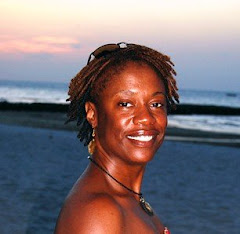
Exactly one week ago, I was sitting in this conference room at the Kenyatta International Conference Centre when this group of men assembled on this stage. It's a scene not unlike many you'll see in African countries; men in positions of power seated at head tables making speeches. But
this group of men had a bit more "oomph" than most.
This was the opening panel of the Pan African Media Conference 2010, and seated at this table were the President of Kenya, Mwai Kibaki, the Vice President of Kenya, Kalonzo Musyoka, the Prime Minister of Kenya, Raila Odinga, the President of Rwanda, Paul Kagame, the former President of Mozambique, Joaquim Chissano, the former President of Tanzania, Benjamin Mkapa, and His Highness the Aga Khan, businessman, philanthropist, founder of Nation Media Group and a descendant of the prophet Muhammad.I guess he needed something to trump all that Presidential energy.
Anyway, sitting there at this exact moment, I knew I was witnessing something quite important. Not only were the logistics involved in getting all of these men together in the same room absolutely mind-boggling, but the topics they were discussing are absolutely pivotal to the future of the African continent:
The role of media in shaping societies, interpreting events, educating citizens, exposing corruption, and in fueling or quelling violence. I learned so much from not only this high-powered panel, but from the entire 2-day meeting. And part of the reason I haven't been blogging is because what I learned is so overwhelming. If I had to try and boil it down, it would be to say that as I experienced my own internal struggles and frustrations about why things don't work here, and why the barriers to progress seem so insurmountable at times, I have to remember that Kenya, and many other African nations, have only been free of colonialist rule for an average of 50 years.
I would love to think, in fact I often DO think, that 50 years is more than enough time to get your act together and make things run smoothly. I have pontificated more than a few times that blaming problems on colonialist oppressors 50 years after they're gone is pretty lame, and that a country's current leaders need to dig down deep, past the petty bickering and short-sighted greed, to find solutions that move their countries forward. And I have said that until powerful media companies like Nation Media Group truly invest in empowering and professionalizing their journalists, they will never be much more than stenographers recording the political back-biting while the people drown in neglect.
But something about last week's conference actually shifted a tectonic plate in my brain. I swear, I'm actually start to believe that maybe, just maybe, the winds of change have begun to blow on this continent, particularly where media is concerned.
I'll let the words of Nation Media Group CEO Linus Gitahi summarize what I think is happening, and why I think this is an amazing time to be involved in African media:
"This is that rarely–ever moment in history. History is turning a page. For over half a century, Africa has sprung, stumbled, run, fallen, rolled over, gotten up and dusted herself and sometimes lurched on. But now over 50 years of self rule, the ride has brought us to the edge of time’s great precipice, and one Africa – a tiny little voice at the back of the head is looking down at the bottom of the ravine and hesitating, the other Africa is looking up at the sky and saying it’s time to fly."
Gives one lots to think about, wouldn't you say?
 Exactly one week ago, I was sitting in this conference room at the Kenyatta International Conference Centre when this group of men assembled on this stage. It's a scene not unlike many you'll see in African countries; men in positions of power seated at head tables making speeches. But this group of men had a bit more "oomph" than most.
Exactly one week ago, I was sitting in this conference room at the Kenyatta International Conference Centre when this group of men assembled on this stage. It's a scene not unlike many you'll see in African countries; men in positions of power seated at head tables making speeches. But this group of men had a bit more "oomph" than most. 




No comments:
Post a Comment